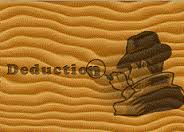记忆方法
将“deduction”分解为“de-”和“duction”。想象“de-”意味着“去除”或“减少”,“duction”联想到“duct”和“duce”,提示这是一个关于引导或产出的过程。结合起来,可以想象为“去掉”或“减少”某些东西的“引导”或“过程”,这样就能记住“deduction”表示扣除、减去或推论的意思。
以上内容由AI生成, 仅供参考和借鉴
中文词源
deduction 演绎,推论,扣除,减去
来自deduce, deduct的名词形式。
英语词源
- deduction (n.)
- early 15c., "action of deducting," from Middle French déduction or directly from Latin deductionem (nominative deductio), noun of action from past participle stem of deducere (see deduce). Meaning "that which is deducted" is from 1540s. As a term in logic, from Late Latin use of deductio as a loan-translation of Greek apagoge.
权威例句
- 1. The allowable deduction is apportioned between the estate and the beneficiaries.
- 减免的税额在地产和受益人之间分摊。
- 2. It was a pretty astute deduction.
- 那是一个颇为敏锐的推论。
- 3. He arrived at the solution by a simple process of deduction.
- 他通过一番简单的推理得出了解决问题的方法。
- 4. No deduction in pay is made for absence due to illness.
- 因病请假不扣工资.
- 5. That seems a reasonable deduction.
- 那似乎是合理的结论.

